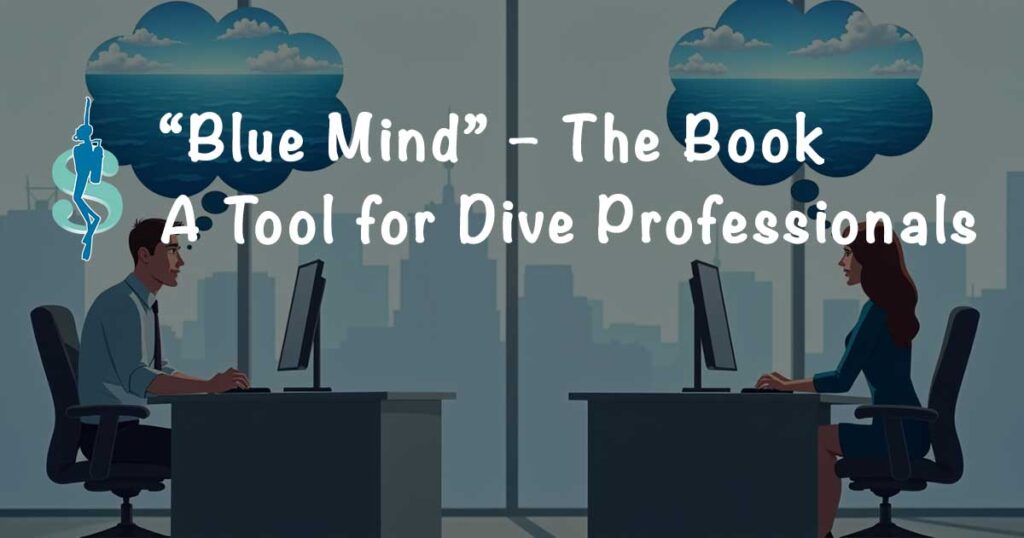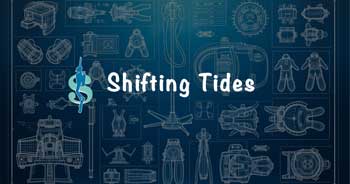Blue Mind by Wallace J Nichols: A Book & A Tool For Dive Professionals
We Can Offer More Than “Scuba Diving” to Today’s Consumers
We’re dive professionals. We’re in the water all the time. We help people learn to dive so they can discover the underwater world. Therefore, we define ourselves as being in “the dive industry.” But wait a minute!
Maybe we’re in the wellness industry, too – or we could be if we changed our perspective a bit.
If you haven’t read Blue Mind by Wallace J Nichols, I suggest you do – for 2 main reasons.
- First, it’s good information if you are a human on planet Earth (which should really be called Planet Ocean). In other words, it’s a great book in itself.
- Second, as dive professionals, we could have additional advantages. Once we understand the benefits of water in people’s lives, we realize that we are offering so much more to our clients than just scuba diving and “learning to dive.”
Blue Mind explores the profound and often overlooked cognitive, emotional, and physical benefits humans derive from being near, in, or even thinking about water. The author investigates the neurological and psychological connections that explain why aquatic environments have such a calming and restorative effect, contrasting this with the stresses of modern, technology-saturated life.
Through personal anecdotes, scientific research, and observations of various water-related activities, the text makes a case for the importance of what it terms a “Blue Mind” state for overall well-being. Ultimately, it suggests that recognizing and nurturing our innate affinity for water can offer a powerful antidote to the pressures of contemporary existence.
This post is part of our Shifting Tides: Dive Industry Assessment & Strategies for Today’s Scuba Divers series by the Business of Diving Institute and Darcy Kieran, author of:
Contents on This Page
An Overview of Blue Mind – The Book
Ever wonder why we feel so darn good when we’re in the ocean?
Well, there’s this awesome book called “Blue Mind: The Surprising Science That Shows How Being Near, In, On, or Under Water Can Make You Happier, Healthier, More Connected, and Better at What You Do” by Wallace J Nichols, and it dives deep (pun intended!) into exactly that.
Basically, Wallace J Nichols talks about this thing called your “Blue Mind,” which is like a mildly meditative state of calm, peace, and happiness you get from being around water. Think about it – that feeling when you’re gliding underwater, the world goes quiet, and all your worries just seem to float away? That’s your Blue Mind kicking in!
Now, for us dive pros, this is pretty cool stuff. We already know how amazing it is to be under the surface – the vibrant reefs, the incredible critters, the sheer joy of exploration. But Wallace J Nichols points out that the benefits of water go way beyond just the fun of blowing bubbles. He talks about how our brains are actually hardwired to react positively to water. Being near it can chill us out, boost our creativity, make us feel more connected, and even help us heal. It’s like the ocean is our natural therapist!
Think about why folks flock to the coast for vacations. They just know they feel better by the water, even if they can’t put their finger on why. Wallace J Nichols backs this up with science, showing how water can shift us from a stressed-out “Red Mind” to a more relaxed and centered “Blue Mind.” It’s not just about escaping the daily grind; it’s about tapping into something deep and primal within us.
What Does This Mean for Us as Dive Professionals?
Well, we’re not just selling an “activity”; we’re offering a gateway to all these amazing Blue Mind benefits. We’re privileged to spend so much time in this incredible environment, and we can totally help others tap into its broader value.
Imagine framing your dive experiences not just as a cool thing to do but as a chance to:
- Reduce stress and anxiety: Emphasize the calming effect of being underwater.
- Boost mindfulness and presence: Highlight how the underwater world encourages focus and being in the moment.
- Enhance creativity and perspective: Maybe mention how the unique environment can spark new ways of thinking.
- Connect with nature and a sense of wonder: We all know that feeling of awe when encountering marine life.
We could talk about how even just being near the water – on the boat, prepping gear by the shore – starts to shift that mental state. Maybe we can even incorporate elements of mindful breathing or quiet contemplation into our pre- or post-dive routines to amplify these benefits.
And here’s the kicker: by highlighting these deeper, more holistic benefits of being in the water, we might just attract a whole new crowd of people who are looking for more than just a fun day out. Maybe someone who’s feeling stressed and overwhelmed might be more inclined to try diving if they knew it could genuinely help them find some peace.
So, let’s think beyond just the gear and the skills. Let’s share the “Blue Mind” magic with everyone we encounter. We’re not just dive instructors; we’re potential well-being facilitators of the underwater world! Who knows, maybe once they experience that incredible connection and those profound benefits, they’ll be even more stoked to become lifelong divers.
Diving Deeper Into the Blue Mind
Let’s wade into some of the more interesting scientific tidbits and stories from Wallace J Nichols’ “Blue Mind” to really show the depth behind this “water makes us feel good” idea. It’s not just hippie-dippy stuff; there’s some serious brain science going on!
First off, Wallace J Nichols emphasizes right from the start that our brains are actually “hardwired” to react positively to water. He mentions how neuroscientists and psychologists are producing research that shows being near water can calm and connect us, boost creativity, and even help us heal. It’s like our brains have a built-in “water appreciation” setting!
He also gets into why this might be. Think about those super relaxing sounds of waves crashing on the beach. Wallace J Nichols asks, “Why does that sound relax us more than nearly any other?” The book explores questions like how our preference for calm lake surfaces might be tied to prehistoric hunting and how understanding somatic tension can explain the pleasure of being submerged. It makes you think that maybe our long history with water has shaped our brains in profound ways.
Wallace J Nichols touches on the science without making it dry (another water pun, sorry!) He recounts attending a Blue Mind Summit where neuroscientists had to explain their work to a diverse group, including divers and artists. Some scientists admitted they were more comfortable with data than with talking about emotions, but when they did explain the “brain on water,” it really resonated with everyone. People were thinking, “Oh my God, really? That’s what happens? My neurons are doing that? It really is your brain on water!” It highlights that the science actually validates what we feel intuitively when we’re in or around water.
The book also introduces the idea of “neuroplasticity,” the fact that our brains are constantly being shaped by our experiences, including our environment. Since our brains are mostly water anyway, it makes sense that being in and around more water could have significant effects.
Wallace J Nichols suggests that the “Blue Mind” state isn’t just a fleeting feeling; it can actually contribute to long-term happiness and well-being. He even mentions that research in the twenty-first century has made the “pursuit of happiness” a key way we judge our quality of life. And guess what? He argues that water provides a “profound shortcut to happiness.”
As dive professionals, we’re offering people a direct route to that Blue Mind bliss!
Wallace J Nichols also discusses the sensory experience of water. Think about the vibrations you feel standing next to a waterfall or the weightlessness when you’re swimming. He emphasizes how these sensations anchor us in the present moment and provide a ton of different stimuli to our brains. It’s not just seeing the pretty fish; it’s the whole physical immersion that contributes to the Blue Mind state.
He even delves into the impact of color, specifically blue. Remember that story about the “Blue Lagoon” quarry in Britain? People kept swimming in it despite warnings about toxic water, but as soon as the local government dyed it black, they stopped. Wallace J Nichols suggests that our attraction to blue water might be deeper than just aesthetics.
Connecting this back to what we do, Wallace J Nichols touches on the power of novelty in natural environments like the ocean. He quotes Michael Merzenich explaining that in less complicated natural landscapes, our brains can really focus on any new event, like a fish jumping. This constant subtle engagement is inherently interesting and rewarding for our brains. Every dive is full of new and fascinating things that captivate our attention in a way that our usual cluttered environments often don’t.
Finally, and this ties directly to how we can connect with others, Wallace J Nichols stresses the importance of storytelling over just throwing facts at people. He quotes Luca Penati, an expert in shaping brands, who said, “The most potent facts and rational arguments for conservation have mostly fallen on deaf ears. Storytelling helps us to communicate the urgency of the situation and the need for immediate action in a more powerful way.”
As dive professionals, we have incredible stories to share – our own experiences, the amazing things we’ve seen underwater, and the profound way the ocean makes us feel. By sharing these stories, we can tap into people’s emotions and show them the deeper value of the underwater world, potentially inspiring them to take the plunge and experience their own Blue Mind.
Related reading: The Critical Difference Between Satisfied and Enthusiastic Scuba Divers
Wrap-up
“Blue Mind” isn’t just a nice idea; it’s packed with scientific insights and compelling stories that support the powerful connection between water and our well-being.
As dive professionals, we’re in a prime position to help people unlock these benefits and, hopefully, inspire a few more to join us in the deep blue!
You may also be interested in the following podcast episode, “Blue Mind” by Wallace J. Nichols, and how we can incorporate “wellness” into our services for scuba divers.
Continue reading about Shifting Tides: Scuba Diving Industry Assessment & Strategies for Today’s Scuba Divers.
If you found the information on this page valuable, would you consider buying me a coffee?
Either way, let’s work together on “raising the bar” in the dive industry to satisfy today’s consumers!
Your Dive Industry Compass
Scuba Diving Market Research, Surveys, Reports & Statistics
Shifting Tides
Strategies for Today’s Scuba Divers
Living The Scuba Dream
Plan Your Scuba Instructor Career & Deep Dive the Plan
You may also be interested in The Immersion Zone (our podcast), Scubanomics (our newsletter for dive professionals), and our published books & reference guides.





